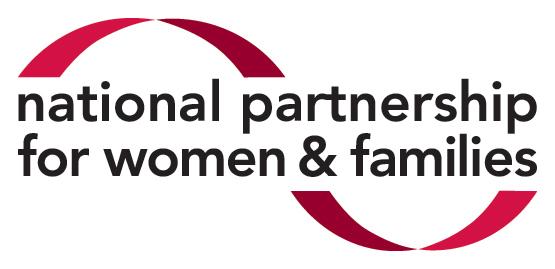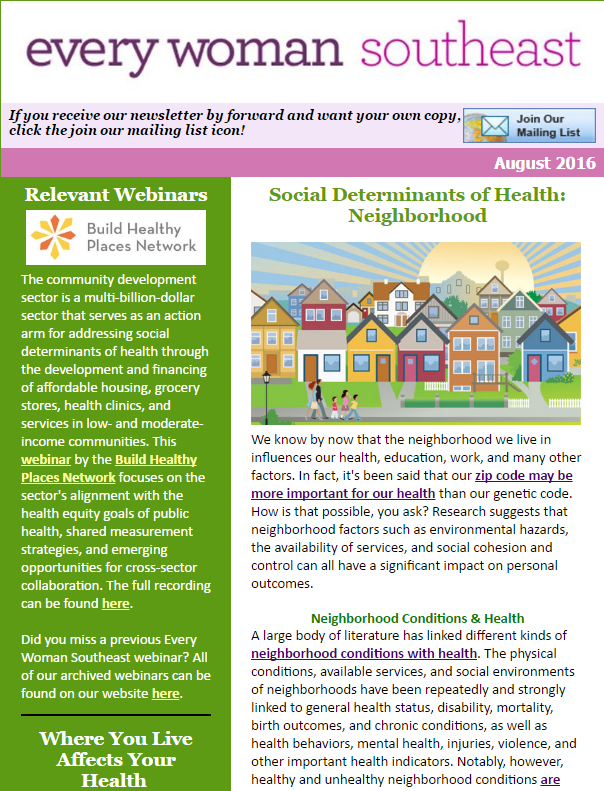|
| | The 4th Trimester of Pregnancy |
Many recognize the challenges that arise during the first, second, and third trimesters of pregnancy, but what about life after baby? This CNN segment talks about the "fourth trimester" and postpartum women's inherent beauty.
Did you miss an Every Woman Southeast webinar? All of our archived webinars can be found on our website here.
|
Going Back to Work after Baby
|
| | How America Fails New Parents -- and Their Babies | Jessica Shortall |
In this TED Talk, Jessica Shortall makes the impassioned case that the reality of new working motherhood in America is both hidden and horrible: millions of women every year are forced back to work within just weeks of giving birth. She advocates that the time has come for us to recognize the economic, physical, and psychological costs of the U.S.'s approach to working mothers.
|
Self-care is essential in the postpartum period. Click here to view and download a template for a self-care plan for optimal mental, physical, and spiritual health post baby.
The American Academy of Family Physicians (AAFP) features on their website extensive content on labor, delivery, postpartum issues and other related topics, including postpartum care and complications, breastfeeding, as well as patient education and self-care. Their website also contains a Postpartum Depression Toolkit with documents and links developed and used during the Translating Screening and Management of Postpartum Depression (TRIPPD) study.
The American Congress of Obstetricians and Gynecologists (ACOG) is dedicated to the advancement of women's health care. In a recent Committee Opinion, ACOG presents multiple clinical recommendations and conclusions for the purposes of optimizing postpartum care.

The National Partnership for Women & Families is a nonprofit organization that promotes fairness in the workplace, reproductive health and rights, access to quality, affordable health care, and policies that help women and men meet the dual demands of work and family. Their website hosts the Listening to Mothers surveys, which capture the views of those who care most about maternity issues: mothers themselves.
|
2017 Newsletters

Is there a newsletter topic that we have not covered that you would like to see in 2017?
All of our archived newsletters can be found on the Every Woman Southeast website.
|
|
 |
|
Postpartum Realities &
Health After Baby
With all the hustle and bustle of bringing a new baby home, women may forget to take care of that other important person... themselves. Taking on a new role as a parent can be deeply rewarding, but it can also be a bit overwhelming at times. Now more than ever, women need to remember to nurture themselves.
The 4th Trimester -- Postpartum Period
Countless books lines the shelves of every bookstore with information about pregnancy and what to expect after delivery. However, most of the available literature focuses exclusively on the baby and, with the exception of a chapter or two, neglects to discuss what happens to a woman's body once she is no longer pregnant. The reality is that in the 12 weeks following the birth of a child, a woman must adapt to multiple physical, social, and psychological changes. She must recover from the delivery, adapt to changing hormones, and learn to feed and care for her newborn, which, for all intents and purposes, continues to function like a fetus d uring its first three months of life. In fact, during this time, mom and baby are often intensely intertwined, as the infant tends to require intense, round-the-clock, womb-like nurturing. 
Not surprisingly, many women experience considerable challenges during this time, including lack of sleep, fatigue, pain, breastfeeding difficulties, stress, depression, lack of sexual desire, and urinary incontinence. Some women may also need to address preexisting health issues, such as substance dependence and chronic diseases. Although home visits are provided in some settings, most women in the U.S. must independently manage their transition into motherhood until their postpartum visit 4-6 weeks after delivery. But this can present yet another challenge, as a nywhere from 20-40% of women do not attend a postpartum visit.
Optimizing Postpartum Health
To optimize women's health in the postpartum period, women and their prenatal providers should have realistic, anticipatory discussions about what to expect after delivery and formulate a postpartum care plan. Comprehensive prenatal counseling should offer guidance about the challenges of parenting and recovery from childbirth, and include a discussion of a woman's reproductive life plan, including her desire for and timing of any future pregnancies and her choice of contraception after delivery. It should also address infant feeding plans, safe sleep, as well as the purpose and value of a postpartum visit with a medical provider. Because the primary source of support for a pregnant or postpartum woman is often her family, to the extent that the woman desires, her family should participate with her and her provider in formulating a postpartum care plan. This plan identifies the family members and health professionals who will support the woman and infant after birth, and identifies the primary care provider who will assume care of the woman after the 4th trimester ends.
|
The 4th Trimester Project at
UNC Chapel Hill
New mother-infant dyads are at risk for a host of clinical concerns. While postpartum issues are extraordinarily common -- affecting 25-50% of the four million women who give birth each year -- treatment is uneven, and health care is often fragmented.
For more information, or to participate in the project, view the 4th Trimester Project website, Facebook, or Twitter page.
|
Postpartum Health Resources
 Childbirth Connection is a core program of the National Partnership for Women & Families with a mission to improve the quality and value of maternity care through consumer engagement and health system transformation. Childbirth Connection promotes safe, effective, evidence-based maternity care and is a voice for the needs and interests of childbearing families. Childbirth Connection is a core program of the National Partnership for Women & Families with a mission to improve the quality and value of maternity care through consumer engagement and health system transformation. Childbirth Connection promotes safe, effective, evidence-based maternity care and is a voice for the needs and interests of childbearing families.
Postpartum Progress is a peer-to-peer 501(c)-3 organization that works to create an atmosphere in which women can recognize when they need help for maternal mental illness, feel safe reaching out for that help, and know that a community of thousands of other mothers stands beside them and behind them. This organization works to create healthier families by raising awareness, reducing stigma, and providing much needed social support for new mothers.
|
|
Have Thoughts to Share?
Write For Our Blog!
Every mom (and dad!) has a story to tell about the birth of their child. Tell us yours!
We'd love to here from you! Share your thoughts by writing for our blog. Click here for more information.
|
|
Stay Connected!


|
|
|